HSE University at SPIEF: Smart Migration and the Future of the Global Economy
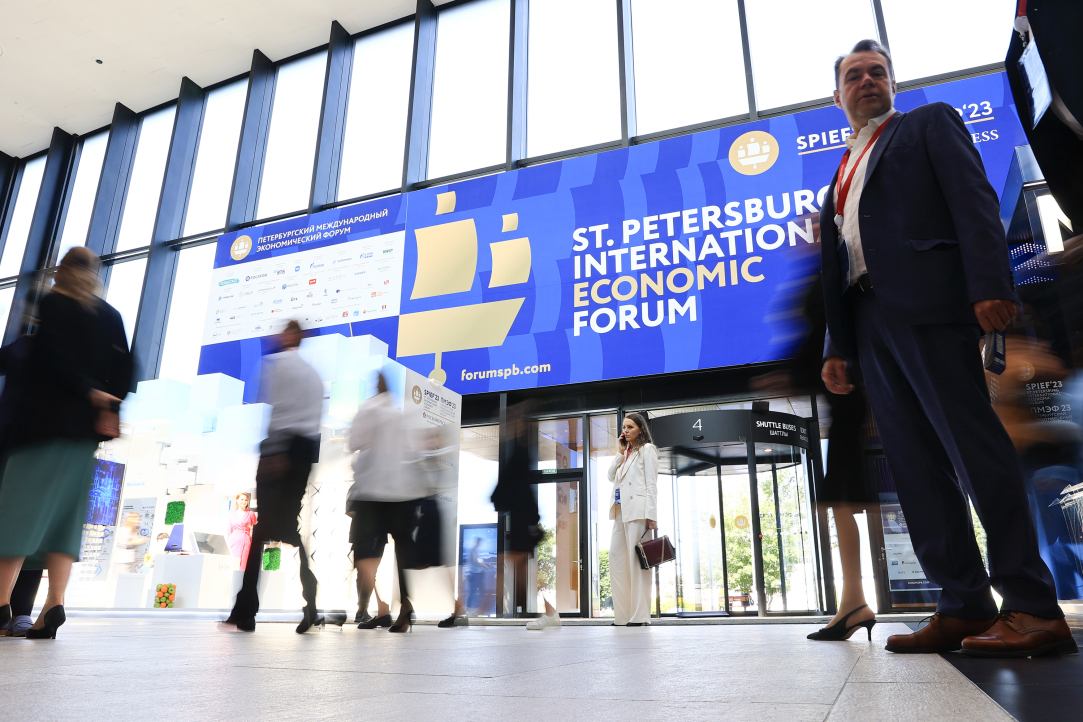
Sessions attended by HSE University experts at the recent St. Petersburg International Economic Forum focused on the digitalisation of migration management, regionalisation of the world economy, participation of companies in global value chains, and many other topics. Below, HSE News Services covers some of the main sessions of the event.
Pressing Issues of the Labour Market and Demography
There were several sessions devoted to the discussion of migration processes in Russia and how they could be improved, including ‘The New Migration Policy: How Is the Labour Market Set to Change and How Can We Attract Highly Qualified Professionals?’.
Lilia Ovcharova, Director of the Institute for Social Policy and session moderator, said that migration is a natural process, people move within the country and across borders for family reasons, for studying, for a new job, or in an attempt to escape natural disasters and military conflicts. Her focus was on how to adjust migration flows so that they can help to solve the problems of the economy and demography without creating discontent in society.

According to Dmitry Volvach, Deputy Minister of Economic Development of the Russian Federation, we need to focus on creating more services related to migration accounting. He believes that digitalisation and the creation of mobile applications will reduce some of the negative factors.
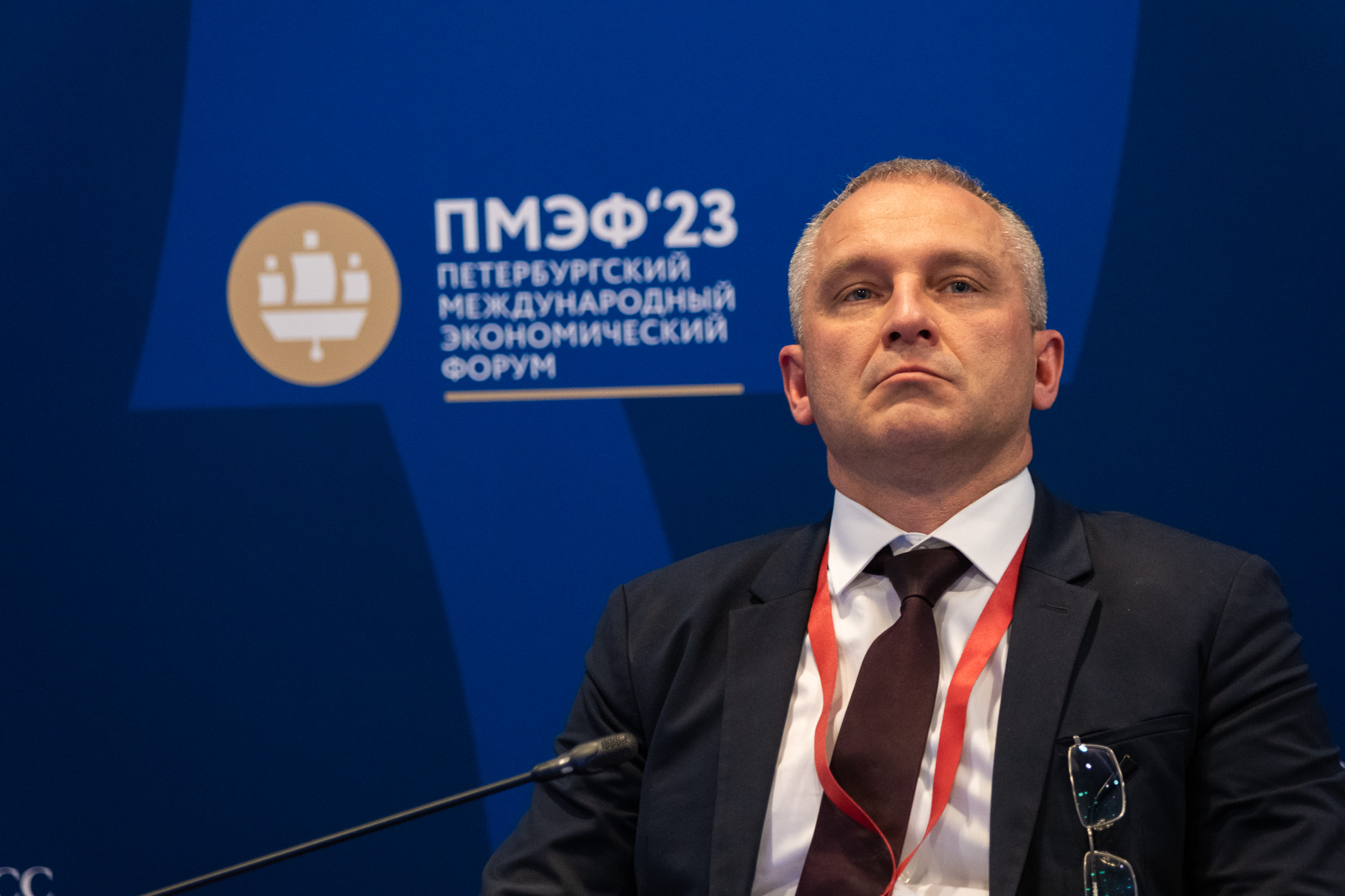
Elena Mukhtiyarova, Deputy Minister of Labour and Social Protection of the Russian Federation added that according to expert assessment of demographic trends, the Russian labour market will need one million additional skilled workers to develop economic sectors in the coming years, rising to 2.5 million by 2030.

Valery Fadeev, Advisor to the President of the Russian Federation; Chairman, Council under the President of the Russian Federation for the Development of Civil Society and Human Rights, and Michael Mawashi, Musician, Public Figure, Blogger, who also took part in the session, drew attention to the problems of migrant adaptation in Russia, their knowledge of the Russian language and teaching migrant children in schools.
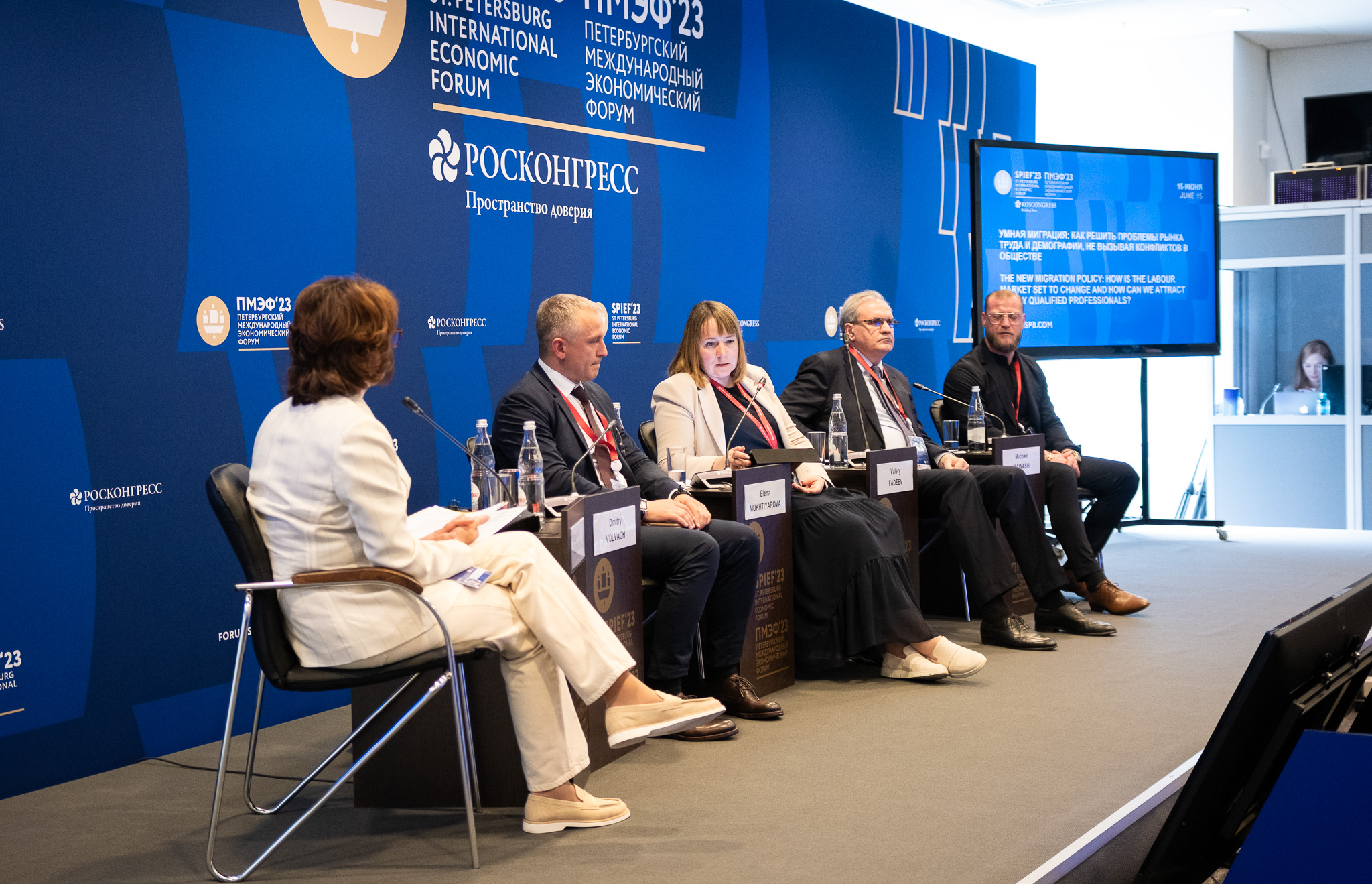
Challenges and Contradictions of International Processes
What steps should be taken to overcome the challenges and contradictions in the global economy, what should be the basis for cooperation between the state and business in eliminating existing gaps and ensuring sustainable development? These and other issues were discussed at the session ‘Moving South: Effective Development in the New World’
Alexander Shokhin, HSE University President, President of the Russian Union of Industrialists and Entrepreneurs and session moderator highlighted the role of SPIEF, which, in his opinion, has been promoting awareness not only of Russian businessmen, but also colleagues from the Eurasian Economic Union for 20 years.
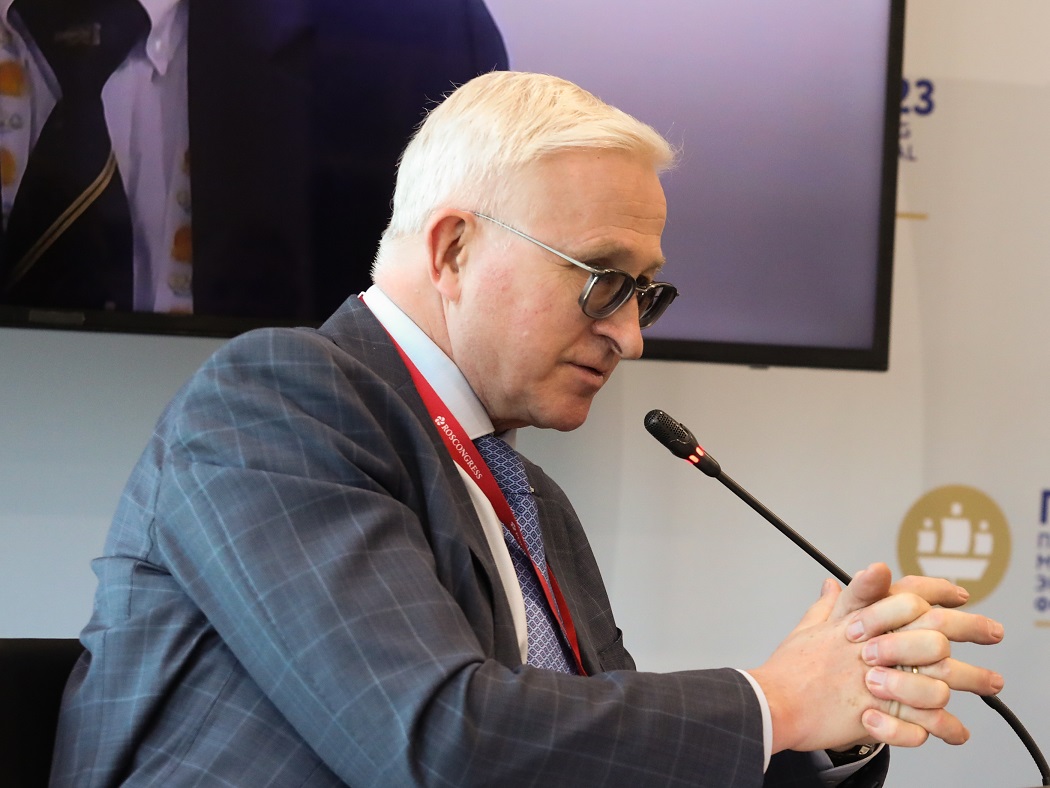
He adds that business and the ‘Business Twenty’ demonstrate a rational and balanced approach towards the conditions of politicisation and engagement of players in the international environment. ‘Those problems which the economies of our countries face, are primarily related to the fragmentation of the world economy and traditional patterns of globalisation. All of this is being transformed into more complex solutions before our eyes,’ he says.
The fragmentation of the world economy, according to HSE University president, has become one of the reasons for the decline in its growth rates.

Alexey Overchuk, Deputy Prime Minister of the Russian Federation, expressed the opinion that today we can see the process of regionalisation and the participation of companies in global value chains. This opens up the opportunity for businesses to scale themselves, enter larger markets, improve their efficiency, and participate in more technological processes.
Victoria Panova, HSE University Vice-Rector, Russian Federation Sherpa for the Women 20, highlighted that the W20 summit is currently taking place. According to Panova, W20 stands out from other formats of interaction due to its balance, mutual respect and movement towards constructive solutions for problems that are common to the G20 countries and all members of the community in terms of achieving equality between men and women.
The following speakers also participated in the session: Andrey Bugrov, Chairman of the Board of Directors, Norilsk Nickel; Member of the Board, Russian Union of Industrialists and Entrepreneurs; Rizal Lukman, Indonesian B20 Sherpa (2022); Shri Abhay Thakur, Additional Secretary, Ministry of Foreign Affairs of the Republic of India; Sous Sherpa of India’s G20; Astha Tyagi, Vice-President, Invest India; Mikhail Khardikov, Head of Energy Business, En+ Group; General Director, Eurosibenergo; Sergey Cheremin, Minister, Government of Moscow; Head of the Department for External Economic and International Relations of Moscow; Chairman of the Board, Business Council for Cooperation with India; Robert Agee, President, Chief Executive Officer, American Chamber of Commerce in Russia.
What Has Replaced Globalisation?
Andrey Bystritskiy, Dean of HSE Faculty of Creative Industries, Сhairman of the Board of the Foundation for Development and Support of the Valdai Discussion Club, in his welcoming speech outlined the session topic ‘New World Economy: Not Global Anymore, but Still Interconnected’.
He noted that it’s time to understand the rules of this interconnected economy and how to live by them. Fyodor Lukyanov, Research Professor at the Faculty of World Economy and International Affairs, Academic Director of the Foundation for Development and Support of the Valdai Discussion Club, said that the Valdai Discussion Club members have been trying analyse what has happened in the world over the past few years: ‘Some things that seemed obvious to us in 2017-2018 are now causing disagreement and the doubts of many. In particular, we introduced the concept of a crumbling world back then, which means that the structure of world institutions developed in the second half of the 20th century no longer works and is eroding for the reason that international realities, both political and economic, have changed dramatically.
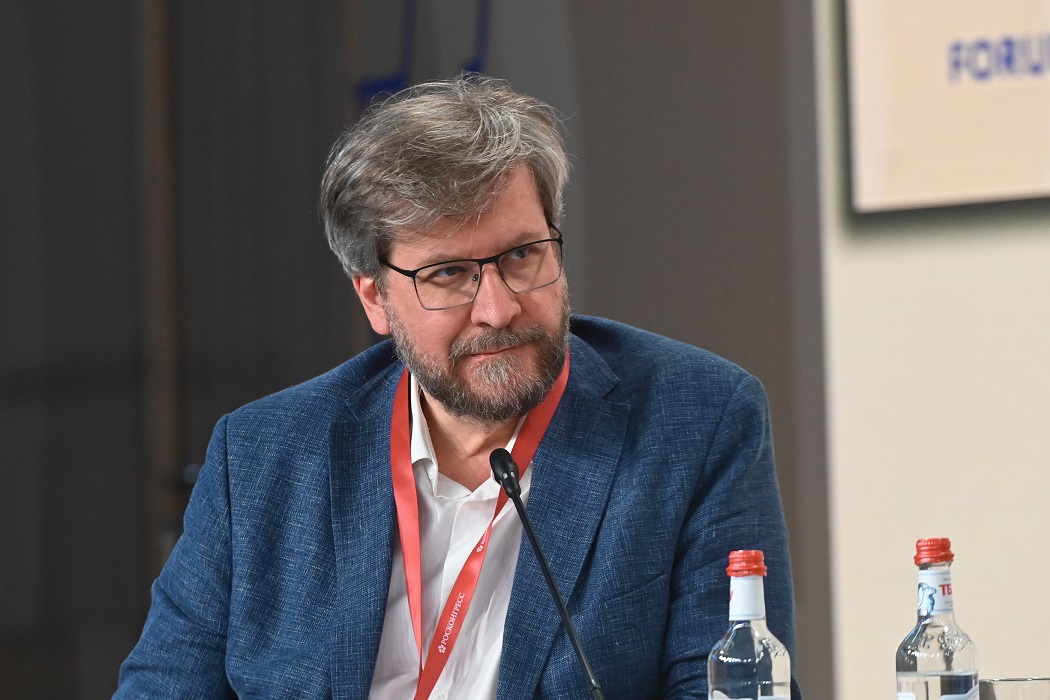
‘We see that politics, like an icebreaker, invades economic issues, and what seemed impossible yesterday, because it was irrational, happens instantly and no one is surprised anymore,’ he continued. ‘This is the new reality that we have to get used to. But at the same time, the most important thing is that this radically changing world is not falling apart, it remains contiguously interconnected in the economic, political, cultural, and informational sense.
However, this interconnection is not synonymous with the globalisation that we have become accustomed to over the previous 3-4 decades. And in this new interconnection we must try to understand what this means for everyone, first of all for Russia. Russia in this case is the same integral part of the world as everyone else.
Does this mean that after some time we will be able to understand what the new principles of functioning are, whether they exist at all? And are these new principles possible in the true form of a coherent system, as it has been until now? I have big doubts about the latter.’
Andrey Belousov, First Deputy Prime Minister of the Russian Federation, spoke about the role of different countries in reducing the global role of the WTO, as well as the reaction of developed countries to climate change, which has become ‘an attempt to create a technological basis for new alliances led by the leading countries of the world and stop the industrialisation of developing countries.’
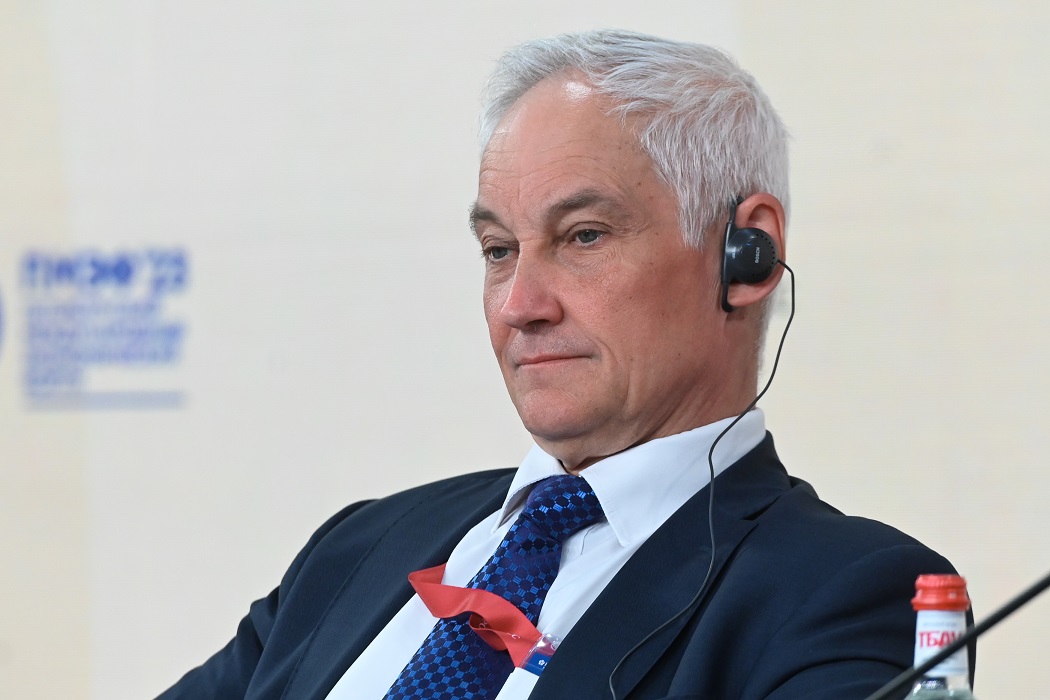
The following panelists also took part in the session: Arvind Gupta, Head, Co-Founder, Digital India Foundation; Benedict Weerasena Samarasena, Research Director, Bait Al Amanah Analytical Center; Gong Jiong, Professor, Vice-President for Research and Strategic Studies, University of International Business and Economics (UIBE).
See also:
HSE University at SPIEF: Innovations, BRICS, and Healthcare
The St Petersburg International Economic Forum took place on June 18-21, 2025. HSE experts have discussed cooperation between universities, investors, and technology companies in the development of innovations, sharing the best practices in healthcare and drug safety, as well as charity and humanitarian collaboration in the BRICS countries. As a result, several cooperation agreements have been signed during the forum.
‘HSE University Considers Training in AI Technologies to Be a Basic Requirement’
‘Technologies of the Future: A Common Global Space or Every Nation for Itself?’ was the title of a session held on June 19, 2025, with the support of Alfa-Bank at this year’s St Petersburg International Economic Forum (SPIEF-2025). The discussion featured HSE University Rector Nikita Anisimov and was moderated by journalist, TV presenter, and public figure Ksenia Sobchak.
'We Are Open to Cooperation on an Equal Basis and Will Find a Path to a Better Future'
How are digital platforms contributing to sustainable development? How is international cooperation progressing in Eurasia? How should the Russia-India business dialogue proceed? HSE University's scientists presented their answers during expert discussions at the St Petersburg International Economic Forum.
HSE Distinguished Professor Sergey Karaganov Moderates Plenary Session at SPIEF
At the plenary session of the St Petersburg International Economic Forum (SPIEF), Russian President Vladimir Putin participated alongside the Presidents of Bolivia and Zimbabwe, Luis Alberto Arce Catacora and Emmerson Dambudzo Mnangagwa. For the first time, a representative from HSE University—Sergey Karaganov, Academic Supervisor of the Faculty of World Economy and International Affairs and HSE’s distinguished professor—served as the moderator of the plenary session.
HSE University Experts Take Part in Preparing Report ‘Russia—Oman—Partnership Prospects’ at SPIEF 2024
The report, prepared by the Roscongress Foundation and experts of the HSE Institute for Public Administration and Governance, covers the current situation in the economy of the Sultanate of Oman and the prospects for Russian-Omani partnership. Prior to SPIEF 2024, HSE was the first Russian university to sign a cooperation agreement with the University of Nizwa (Oman).
HSE University at SPIEF: From Cyber Gaming to Arctic Development
The timeliness of Russia’s first cyber gaming platform, the importance of closing the gender gap in the IT industry, and the future of international cooperation in the Arctic were just some of the issues discussed at the St Petersburg International Economic Forum (SPIEF). The HSE News Service reports on some of the topics of discussion at the forum.
Qatari Ambassador Ahmed Al Thani Visits HSE University
During the St Petersburg International Economic Forum, HSE University-St Petersburg hosted Sheikh Ahmed bin Nasser bin Jasim Al Thani, Ambassador of Qatar to the Russian Federation.
HSE University and Rossotrudnichestvo Agree to Train Specialists in Teaching Russian as a Foreign Language
HSE University and Rossotrudnichestvo have signed an agreement to establish a Russian Language Centre at HSE University in St Petersburg. It will train teachers of Russian studies and future leaders of educational programmes and courses of Russian as a foreign language. The document was signed by HSE University Rector Nikita Anisimov and Head of Rossotrudnichestvo Yevgeny Primakov at the St Petersburg International Economic Forum.
HSE University and Agency for Strategic Initiatives Sign Cooperation Agreement
HSE University and the Agency for Strategic Initiatives (ASI) have agreed to cooperate in the development of new technologies, the digital transformation of the economy, and the social development of the country. The agreement was signed by HSE University Rector Nikita Anisimov and ASI Director General Svetlana Chupsheva at the St Petersburg International Economic Forum.
HSE University Concludes 12 Cooperation Agreements as Part of SPIEF
During the St. Petersburg International Economic Forum, HSE Rector Nikita Anisimov signed cooperation agreements with regional heads, university rectors, heads of companies, government agencies, public organisations, and cultural institutions. This cooperation with new partners will cover a wide range of areas—from educational and research projects to student expeditions and youth policy.


